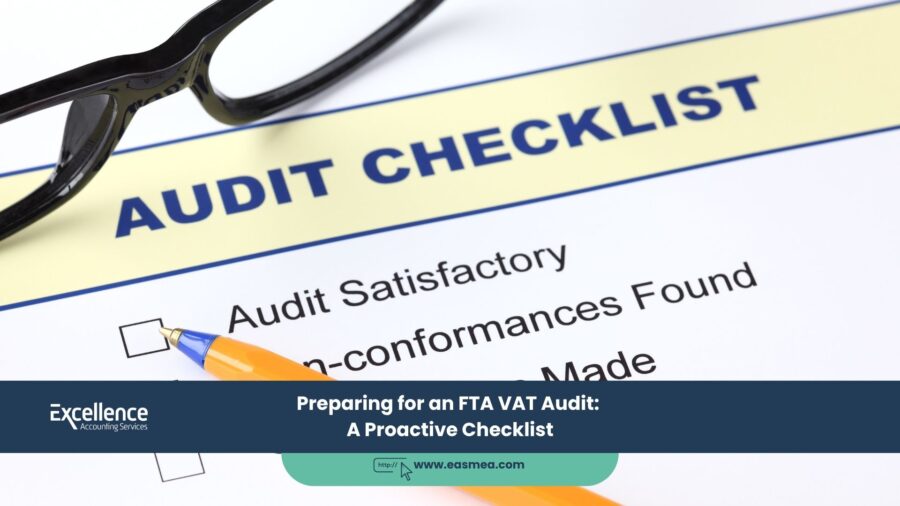Preparing for an FTA VAT Audit: A Proactive Checklist
For any VAT-registered business in the UAE, the possibility of an audit by the Federal Tax Authority (FTA) is a constant reality. An audit notification is not an accusation of guilt, but it is a formal and serious process that demands a swift, organized, and thorough response. The difference between a smooth, manageable audit and a stressful, costly ordeal lies in one word: preparation. Proactive compliance is your best and only defense.
- Preparing for an FTA VAT Audit: A Proactive Checklist
- The Proactive Audit Preparation Checklist
- 1. Documentation and Record-Keeping
- 2. Internal Review and Reconciliation
- 3. System and Process Readiness
- Face Any Audit with Confidence with EAS
- Frequently Asked Questions (FAQs)
- Are You Audit-Ready? Don't Wait to Find Out.
An FTA VAT audit is a detailed review of your business’s financial records to verify that the information declared on your VAT returns is accurate and complete. The auditors will scrutinize your sales, purchases, and the input VAT you have reclaimed to ensure everything aligns with the UAE VAT law. Being unprepared can lead to the discovery of errors, resulting in significant penalties and a damaged reputation with the tax authorities.
This guide is designed to shift your perspective on audits from reactive fear to proactive readiness. We provide a comprehensive checklist that outlines the essential steps your business should take *now* to prepare for a potential future audit. By embedding these practices into your daily operations, you can build a state of “audit readiness” that will allow you to face any FTA inquiry with confidence and control.
Key Takeaways
- Audit Readiness is a Continuous Process: Preparation for an audit should be part of your daily financial management, not a reaction to an FTA notification.
- Documentation is Your Shield: The entire audit process hinges on your ability to provide valid supporting documents for every transaction. Immaculate record-keeping is non-negotiable.
- A Valid Tax Invoice is Golden: The single most important document is a compliant tax invoice. Without it, your input VAT claims are invalid.
- Know Your High-Risk Areas: Be prepared for deep scrutiny of input tax apportionment, the Reverse Charge Mechanism, and claims related to blocked expenses.
- Conduct a Self-Audit: Proactively reviewing your own returns (a “VAT Health Check”) can uncover and fix errors before the FTA finds them.
- Professional Representation is Essential: Engaging a registered tax agent to manage the audit process is the most effective way to protect your interests and ensure a smooth outcome.
The Proactive Audit Preparation Checklist
The best way to survive an audit is to prepare for it before it ever happens. Use this checklist to assess and strengthen your company’s state of audit readiness.
1. Documentation and Record-Keeping
This is the foundation of your defense. For every number on your VAT return, you must have a clear, auditable trail back to a source document.
- Maintain a Centralized Digital Archive: Keep digital copies of all tax-related documents for the legally required minimum of five years. This includes:
- All sales invoices and credit notes issued.
- All supplier tax invoices and debit notes received.
- All import/export documentation (customs declarations, shipping documents).
- Bank statements for all business accounts.
- Ensure Invoice Compliance: Regularly check that the invoices you receive are fully compliant with FTA requirements (e.g., they include the supplier’s TRN, a clear VAT breakdown, etc.). You cannot reclaim VAT using a non-compliant invoice.
- Utilize a Robust Accounting System: A system like Zoho Books is essential. It provides a clear audit trail, links transactions to source documents, and can generate the FTA Audit File (FAF) required by auditors.
2. Internal Review and Reconciliation
Before the FTA reviews your books, you should be the first to do so. Regular internal checks are crucial.
- Conduct Monthly Reconciliations: Ensure your bookkeeping records match your bank statements without fail.
- Perform a “VAT Return to P&L” Reconciliation: At the end of each quarter, reconcile the total revenue reported on your VAT return with the revenue shown on your Profit and Loss statement. Be prepared to explain any differences.
- Review High-Risk Transactions: Proactively review your treatment of complex areas:
- Input Tax Apportionment: If you make mixed supplies, is your apportionment calculation logical and well-documented?
- Reverse Charge Mechanism (RCM): Have you correctly applied RCM on all imported services?
- Blocked Expenses: Have you correctly identified and excluded VAT on non-recoverable expenses like client entertainment?
3. System and Process Readiness
Your internal processes should be designed with compliance in mind.
- Generate the FTA Audit File (FAF): The FAF is a standard file format required by the FTA. Check if your accounting system can generate this file correctly. This is a standard feature in FTA-accredited software.
- Document Your VAT Policies: Have a simple, written policy that explains how your company handles key VAT decisions (e.g., how you classify different revenue streams, your process for verifying supplier invoices).
- Appoint an Audit Point Person: Designate a single, knowledgeable person (e.g., your finance manager or CFO) who will be responsible for managing the audit process if a notification is received.
An audit is won or lost in the months and years *before* the notification arrives. Consistent, disciplined financial management is the only secret to success.
Face Any Audit with Confidence with EAS
Don’t wait for an FTA notification to get your house in order. Excellence Accounting Services (EAS) provides proactive services to ensure you are always audit-ready.
Our VAT Audit Support Services:
- VAT Health Check: Our tax experts conduct a comprehensive review of your records and past VAT returns to identify and help you rectify any potential risks before the FTA does.
- FTA Audit Representation: As registered tax agents, we can manage the entire audit process on your behalf, from the initial response to final negotiations, ensuring your interests are protected.
- Documentation and System Setup: We help you implement robust record-keeping systems and processes to build a state of continuous audit readiness.
- Voluntary Disclosure Assistance: If we find an error during our review, we can assist you in preparing and submitting a Voluntary Disclosure to mitigate potential penalties.
Frequently Asked Questions (FAQs)
The FAF is a standardized file that contains all your accounting transaction data in a specific format that can be easily imported and analyzed by the FTA’s auditing software. FTA-accredited accounting systems like Zoho Books can generate this file automatically.
The FTA will send an official notification to your company’s registered email address and upload it to your EmaraTax portal. The notification will specify the tax period(s) under review and the initial documents required.
The most common reasons are the incorrect reclamation of input VAT (due to missing invoices or claiming on blocked items), failure to correctly apply the Reverse Charge Mechanism on imports, and incorrect classification of supplies (e.g., treating a standard-rated supply as zero-rated).
The duration varies depending on the complexity of your business and the quality of your records. A simple desk audit for a well-organized SME might take a few weeks. A complex field audit for a large corporation could take several months.
While you are legally allowed to, it is highly inadvisable. A registered tax agent understands the nuances of the law, knows what auditors are looking for, and can act as a professional intermediary. Their expertise is invaluable in ensuring a smooth process and protecting you from unnecessary penalties.
You should immediately discuss it with your tax advisor. The best course of action is usually to file a Voluntary Disclosure with the FTA to correct the error. Doing so before the audit begins demonstrates good faith and can lead to significantly lower penalties than if the FTA discovers the error themselves.
You have the right to be treated professionally, to be informed of the audit’s scope, to appoint a tax agent to represent you, and to appeal the FTA’s decision if you disagree with the outcome. The FTA is also obligated to keep your business information confidential.
A desk audit is conducted remotely from the FTA’s offices. They will request you to submit documents electronically. A field audit is when the FTA’s auditors physically visit your business premises to inspect records, systems, and even physical inventory.
Not necessarily. The FTA can audit any business for any tax period within the statute of limitations (generally 5 years). However, passing a clean audit is a very strong indication that your systems are robust and can reduce your overall risk profile.
Engage a professional tax agent immediately. Do not attempt to communicate with the FTA or submit documents without expert guidance. Your tax agent will manage the process, protect your rights, and ensure the best possible outcome.
Conclusion: Turning Readiness into a Routine
An FTA VAT audit is a standard part of the UAE’s mature tax system. By viewing it not as a threat, but as a predictable event that you can prepare for, you can remove the fear and uncertainty from the process. A state of continuous audit readiness, built on a foundation of meticulous record-keeping, robust systems, and proactive self-review, is the hallmark of a well-managed and resilient business. It is the ultimate strategy for not just surviving an audit, but for thriving in a compliant and transparent business environment.
Are You Audit-Ready? Don't Wait to Find Out.
Let our expert tax agents review your records and processes to identify and fix risks before the FTA comes knocking.




